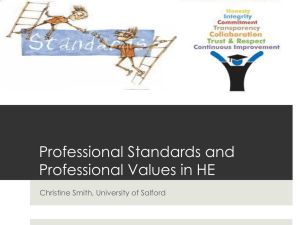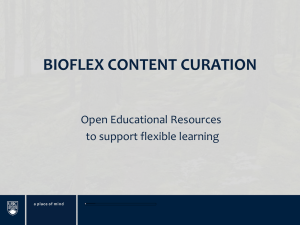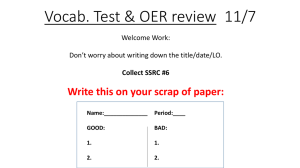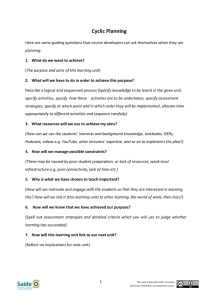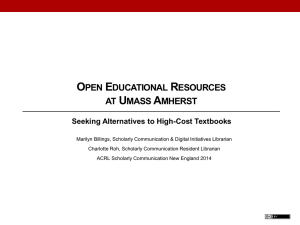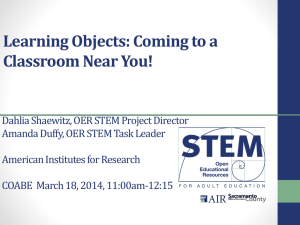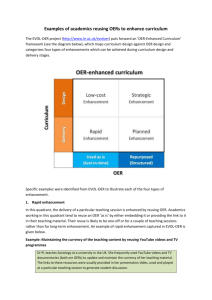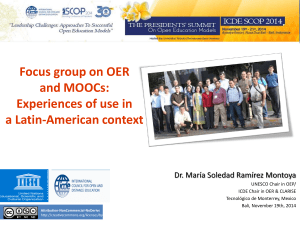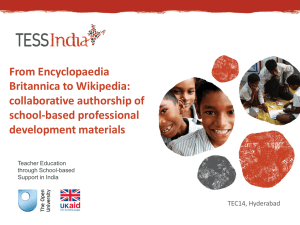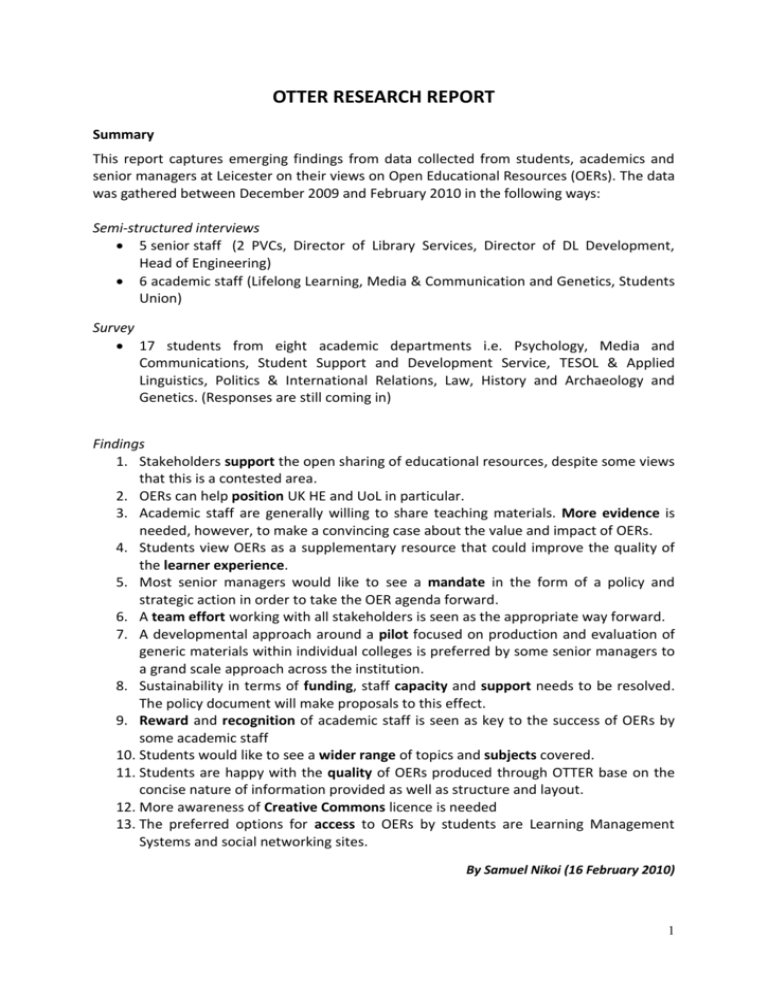
OTTER RESEARCH REPORT
Summary
This report captures emerging findings from data collected from students, academics and
senior managers at Leicester on their views on Open Educational Resources (OERs). The data
was gathered between December 2009 and February 2010 in the following ways:
Semi-structured interviews
5 senior staff (2 PVCs, Director of Library Services, Director of DL Development,
Head of Engineering)
6 academic staff (Lifelong Learning, Media & Communication and Genetics, Students
Union)
Survey
17 students from eight academic departments i.e. Psychology, Media and
Communications, Student Support and Development Service, TESOL & Applied
Linguistics, Politics & International Relations, Law, History and Archaeology and
Genetics. (Responses are still coming in)
Findings
1. Stakeholders support the open sharing of educational resources, despite some views
that this is a contested area.
2. OERs can help position UK HE and UoL in particular.
3. Academic staff are generally willing to share teaching materials. More evidence is
needed, however, to make a convincing case about the value and impact of OERs.
4. Students view OERs as a supplementary resource that could improve the quality of
the learner experience.
5. Most senior managers would like to see a mandate in the form of a policy and
strategic action in order to take the OER agenda forward.
6. A team effort working with all stakeholders is seen as the appropriate way forward.
7. A developmental approach around a pilot focused on production and evaluation of
generic materials within individual colleges is preferred by some senior managers to
a grand scale approach across the institution.
8. Sustainability in terms of funding, staff capacity and support needs to be resolved.
The policy document will make proposals to this effect.
9. Reward and recognition of academic staff is seen as key to the success of OERs by
some academic staff
10. Students would like to see a wider range of topics and subjects covered.
11. Students are happy with the quality of OERs produced through OTTER base on the
concise nature of information provided as well as structure and layout.
12. More awareness of Creative Commons licence is needed
13. The preferred options for access to OERs by students are Learning Management
Systems and social networking sites.
By Samuel Nikoi (16 February 2010)
1
1. Knowledge and understanding of the term “Open Educational Resources”.
Senior Management
OER has parallels with
open access research
OER is a contested
area, without sufficient
evidence.
Academic staff
Students
Quotes
Free and open sharing
of quality resources
Resources accessible to
everyone
Opportunity to share
success story and
expertise
Materials freely
available online
Materials for students
enrolled on distance
learning programmes
A tool for teachers and
students to share
Resources for courses
online
Information and
knowledge freely
available to all
Information to anyone
to read and/or edit.
Resource open to all in
the academic
community
Resources that differ
from traditional
learning; focused on
interactional input
utilising technology.
A resource simple to use
and easy to access
One of the key drivers for open
access to research materials
was that institutions which
were funding research wanted
the outputs of those research
projects to be more available to
people so there was a driver
there which perhaps isn't there
is the same way in terms of
OERs (Senior Manager)
Students
Quotes
Students generally found it
easy using the OERs and
gave the following reasons
for their satisfaction:
Layout and structure
o Clearly labelled
titles/sub titles
o side bar
subject headings e.g.
genetics
Visible and functioning
links
Useful abstracts
Language (clarity and
easy of reading)
User friendliness
The titles were clearly labeled
and easy to follow (student)
There is no problem of people
creating resources but it is the
problem of accessing them and
using them that is the issue
(Senior Manager)
Knowledge should be
transferred, it should be freely
available and OERs enable that
to happen (Uni. Staff member)
Resources open to all in the
academic community… come in
varied forms many differing
from the traditional process of
learning; focusing on a more
interactional input that utilise
available technology. (student)
2. Ease of navigation through the OERs
Senior Management
Academic staff
The links were mainly visible
and accessible. (student)
It was very clearly listed under
the psychology which then
followed on with a useful
abstract explaining what the
resource was about (student)
I couldn’t access the web
page. (student)
2
3. Quality of the OERs.
Senior Management
Academic staff
Students
Quotes
Very concise
right quantity of details
relevance to course
Students are generally
happy with the quality of
OERs for the following
reasons:
Convenience of getting
information.
Visually engaging
Appropriate details
How nicely laid out
Use of diagrams to
support text
Different formats e.g.
images and PDF
Clarity of language
good structure
The person who put it together
obviously spent time thinking
about the right quantity of
details to convey in other for the
messages to be concise but
accessible. (Uni. Staff member)
Students
Quotes
Blackboard and social
networking sites were the
preferred
options
for
access to OERs base on the
following reasons:
Convenience of access
Fun of educating others
Address habits of
accessing information by
different people.
Accessible to academic
community.
Sharing capabilities with
peers
How platform promote
discussions
Familiarity of platform
Easy of navigation
Generic nature
A space for staff and
students
I think it might benefit the
student body if the information
is not just in one place, so there
isn’t one repository located on
one particular website but
instead located across many
different platforms. (Uni. Staff
member)
The information on DNA which is not my course - looks
very interesting and detailed
enough to explain to a novice
about the topic. (student)
There's only one subject. It'd
be better to have wider range
of topics and maybe relevant
additional information.
(student)
4. Preferred options for accessing the OERs.
Senior Management
Academic staff
Public repositories and
mobile devices were seen
as desirable options.
Blackboard and other
institutional learning systems
are very useful for accessibility
for the academic community.
It would allow sharing
capabilities for peers and
lecturers in the discussion
groups and be generally easier
to access as it is the common
medium for universities
(Student).
Through the university is
helpful for specific course
information but having it on
social networking sites helps
educate further people in a
fun way on the general
information. (Student).
3
5. Business case for sharing teaching and learning materials.
Senior Management
Academic staff
Students
Quotes
Marketing and branding
of UK higher education
Recruitment of foreign
students to study in the
UK
Efficient gains in terms
of duplication of effort
Improvement in the
quality of teaching
Materials that provide
structure to engage
students
Time saved e.g.
demonstration lessons to
a large class
As an add-on to forms of
assessment
Improvement in teaching
style
Stimulating the learning
environment
Students see the value of
OERs to their learning
base on the following
reasons:
get away from textbooks
useful for revision
how to give
presentation
Access to wider range of
materials
general knowledge on
various subjects
knowledge on specific
topics
Great for grasping basic
concepts that more
complex
helps to reach out to
groups without access
to HE
No business case should be
based on lack of information
and there should be some
case study analysis of possible
losses, direct and indirect
gains. (Senior manager)
We have to make these things
interesting, worthwhile, and
interactive. I think the prize is
to see that there is a more
stimulating learning
environment than you would
even have in the lecture hall
(Academic staff)
[The OER] would allow me to
deeply understand the subject
Ancient History especially
which is hard to fully interpret
due to the lack of sources and
general limitations. (Student).
Great for revision, quite basic
though, good for grasping basic
genetic concepts that more
complex concepts are built on
(Student).
6. Maximizing the impact of repositories (LRA, OTTER and CDDU tasters) in a
coordinated way
Senior Management
Academic staff
Students
Quotes
Owners of
resources/materials
need to work together
OTTER need to join-up
with DL, Marketing and
International Office
Address educational
design issues
Ease of access
A searchable catalogue
to find out what OERs
are available
It’s highly undesirable if
individual units within UoL
are setting things up
without reference to the
other and that will be a
waste of opportunity and
effort. (Senior Manager)
Work closely with DL… I’m
not persuaded that this
contact is working well, at
present, and it should do
so (Senior Manager)
4
7. How OERs will benefit the University of Leicester.
Senior Management
Academic staff
Students
Quotes
a. Marketing
a. Marketing
Student recruitment
using taster courses
institutional visibility
Bring in more students
Good name
As champion of open
learning
Could damage reputation
a. Marketing
Attract students to the
University
increase
University's
reputation as champion
of OERs
Reputation as socially
responsible university
Reach out to university
community.
Promote distance and
flexible learning
We should be careful not to
spin off benefits without
analysing them… How is
student experience improved
specifically by open access?
(Senior Manager)
b. Teaching
Improved quality of
teaching materials
Academic time saving
c. Learning experience
b. Teaching
Improved teaching
methods / assessment
Concise way of presenting
information to students
c. Learning experience
Improve student
satisfaction
More interaction with
students
Stage the development of
student work through a
series of exercises.
Explore new subjects in
different disciplines
Improve student learning
in their own time
b. Teaching
Lesson planning in
teaching
Share expertise and
learn from other
resources
Help expand knowledge
Improve research in
teaching styles
c. Learning experience
Make learning simpler
Easier for students to
access learning
resources.
Help revision, making
notes and writing
essays.
Links to external
resources
Support and enhance
mobile learning
encourage sharing of
more information
Resource equivalent to a
library.
OERs are starting to show me
the kinds of things I could do to
make our course a lot more
interesting” (Academic staff)
I think there will be a risk of for
instance the status you have as
university of Leicester if people
sort of like download things
and make the quality less but
still it has the university logo.
(Academic staff)
For example for students
studying economics…they
might have an interest in
another area of academia
which they just want to explore
but don’t want to go to the
library and find a textbook
because that’s too much what
the learner wants. (Uni. Staff
member)
It makes Leicester a beacon of
possibility in terms of inspiring
others to create similar
resources (Uni. Staff member)
I often travel to work by train
and bus which gives me an
hour and a half of study time
each way. I have two small
children at home and a
dedicated, but tired wife, so
having the option to download
these materials in a form that
allows me to study on my 3
hour commute to work would
be fantastic. (Student)
It would allow the university to
reach out to a greater spectrum
within the university
community. Distance and more
flexible learning would become
greatly encouraged and
improved, and they could
therefore attract more of these
types of students. (Student)
5
8. Policies are needed to encourage sharing of quality teaching and learning materials
Senior Management Academic staff
Students
Quotes
a. Management
commitment
A mandate
A decision on what to
share that is common to
all
College level policies
b. Access
c. Maintenance & update
d. Teaching and learning
Getting more students
to use OERs
e. Technology and media
Address what
infrastructure is needed
Standards and quality
a. Management
commitment
Promote a culture of
sharing across
departments
b. Access
on social networks
Via search engines
Through Blackboard
Availability to all students
c. Maintenance & update
d. Teaching and learning
How OER can improve
collaborative learning
Using OER as a teaching
resource
e. Technology and media
f. IPR
f. IPR
g. Support
Training and support for
staff
a. Management
commitment
Commitment to OERs
b. Access
on social networks
Via search engines
Through Blackboard
Availability to all
students
c. Maintenance & update
OER as learning
resource
Regular updates
d. Teaching and learning
Wider spectrum within
subjects
Variety of resource
Relevance to
programmes / topics
Opportunity to build
own digital resource to
facilitate mobile
learning
Improve learning
opportunities
Referral by staff
I have very little interest in
making little bits of teaching
available to others… what
the hell do you do with this?
(Senior manager)
Within the University,
perhaps, to get the students
to use them more…because
the students are excellent
ambassadors for these sort
of thing (Academic staff)
I think it will be helpful if you
would get messages across
that it is a good thing, that it is
a good thing to share
resources (Academic staff)
I still use the material
whenever I have time and
whenever I need to check
something for my essay
(student)
The University could say that it
would promote this free and
open style of learning (student)
e. Technology and media
Variety of media
MP3 versions of
lectures
f. IPR
Guarantee for authors
of materials
6
9. The nature of support needed to develop, re-use and repurpose OERs
Senior Management
Academic staff
Need practical support
so there is no extra
work involved
Need a team approach
Employ students to help
Support to develop Etivities that explain
difficult concepts or
complex processes to
student
Support for adapting/
modifying OERs especially
multi-media OERs like
videos
Knowledge of creative
common licences
Make time available to
staff to develop OERs
Students
Quotes
I think there will have to be a
lot of practical support to
enable staff to do…probably
more support than the case of
research materials (Senior
Manager)
It is not acceptable to expect
academics to be able to
develop the sort of
resource...and that’s why you
develop the whole raft of
support services, educational
designers, and educational
technologist. (Senior
Manager)
From our experience with
GENIE, I think we can see that
lots of colleagues are very
very willing to help, but it all
boils down to I think time to
do it or don’t have money to
do it. (Academic staff)
10. Knowledge of “Creative Commons license” and what is allows with regard to OERs
Senior Management
Academic staff
Not sure
Lack of knowledge
about the OER process
Students
Waive rights reserve
Share, print and
redistribute
Create and
communicate
Edit and share materials
Allow personal use of
materials
Share materials in a
community.
Materials not used
commercially
Some were not sure
Not too clear on this
Quotes
Not very much, that is the first
time I have heard that term. If
we can have this interview
again then I can answer that
specific question if you want me
to. (university staff member)
I have heard about creative
commons license but I don’t
know anything about the
process. I don’t know how the
system is policed in anyway.
(staff)
I wasn’t too clear on this but I
think it allows the uses of
information which applies to UK
copyright laws, but any
reference to third party
information may not abide by
these rules (student).
This license allows the OERs to
be published online and shared
within the university
community. (student)
7
11. Motivation to continue the use of OERs
Senior Management
Academic staff
Students
Quotes
Information not
presented in a textbooklike fashion
Different format (print,
audio, images and links
to other resources).
Structure and layout for
easy of navigation
Provide access anytime,
anywhere
Add more subjects and
expand topics.
Provide hyperlinks to
other resources
Add pictures and videos
Possible revision
questions to reinforce
the information.
Remove timers and
allow users to go at own
pace.
Link from UoL homepage
or Blackboard.
Hopefully with the development
of such resources they would
expand beyond the realms of
subject specific knowledge into
other things that typically is
quite difficult to explain and
that’s interesting. (University
staff member)
Possible revision questions to
reinforce the information.
(student)
Definitely more materials
needed...e.g. DNA sequencing
and Genetic Engineering
techniques e.g. cloning methods
(student).
12. How OERs can be made more sustainable
Senior Management
Academic staff
Students
Quotes
OER is a very expensive
business
How to maintain and
update the materials
Ways to addressing the
“not invented here
syndrome”
Adopt a developmental
approach starting with a
pilot in generic subjects
Time needed to develop
resources
University should pay for
development of OERs
Set up a discussion
board for sharing ideas
and experiences
Available in languages
that benefit
international students
I think it can’t be done in the
current environment… there
are different cost to be funded.
(Senior Manager)
This isn’t about open
educational resources this is
about how we develop and
sustain good teaching
learning and how we
maximize the use of our
resources so that we are not
all reinventing the wheel
(Senior Manager)
The critical issue for
sustainability is how you
repurpose the material and
train people to do
this(Senior Manager)
I think somehow the university
should find money to pay for it.
I think it is a very valuable thing
to have these resources, like it
is very valuable to have very
good teachers and they cost
money as well. (Academic staff)
Need to reach out to others not
only in the universities also
through the media (Student)
8
13. Reward and recognition for making teaching materials freely and openly available
Senior Management
No easy answer
Academic staff
Students
Promotion
Treat OER development
similar to peer-reviewed
journal papers
Quotes
I think it is important that when
people create good materials
that they get proper formal
recognition for it... with respect
to promotion within the
structure of the university.
That’s really what it comes
down to. (Academic staff)
I think if you produce good
teaching resources then there
should also be a point
somewhere on a scale and you
say right yes this is what you’ve
done and it should be similar to
research outputs because I
think these are teaching
outputs”. (Academic staff)
14. Risks and concerns associated with OERs
Senior Management
Need for research and
development so that
we are very well
informed about what
the issues are
Possible conflict with
DL strategy
Quality control – cf
vanity-publishing.
Raising expectations
and not being able to
meet them.
Failing to exploit the
marketing advantages.
Not anticipating costs,
hidden or otherwise.
Copyright clearing
Academic staff
Students
Quotes
Evidence of how OERs
improve student
recruitment and
competitiveness of the
University of Leicester.
Copyright and losing
control over how
materials are used in
different contexts
Reward and recognition
for staff who make quality
OERs available
Clear strategic
commitment towards
mainstreaming OERs.
Effective access to
resources
How OERs are used once
downloaded
Possibility of diluting
quality and message
Designing for active
learning e.g. e-tivities
that make learning more
engaging and interactive
Improve the quality of
OERs through constant
updating
Support for finding and
using OERs
Address copyright and
plagiarism
Technical concerns e.g.
link not working
Include speeches public
lectures held in other
departments
Who pays for it
Use author identity as
quality mark
Free access to online
books
students involvement in
OERs
plagiarism
Blind copying. Laziness
in attending lectures
Mandatory log-in for
site security.
Deciding when to engage with
a new initiative is a crucial
thing and I think we are doing
absolutely the right thing in
terms of being fully engaged
through OTTER (senior
manager)
I think our main concern is that
we still don’t feel that a fully
convincing case has been made
on making everything available
on a totally open basis.(staff)
If you un-take bits out of it
[OER] you actually may ruin the
story. So that is a concern.
(staff)
My concern is that you don’t
know once it is downloaded
what is happening to it. (staff)
Increase likelihood of
plagiarism? Blind copying.
Laziness in attending seminars
and lectures? (Student)
I think as a student paying a lot
of money for these resources
maybe it is unfair for people to
get them for free, but ion the
other hand individuals should
not have to pay for knowledge
so I think freely educating
people is a good idea (student)
9


